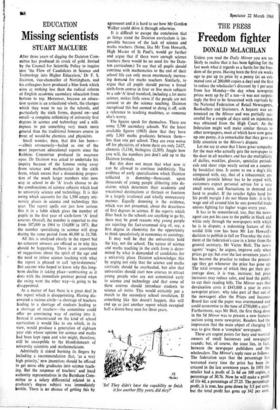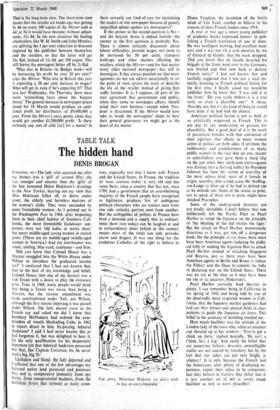Freedom fighter
THE PRESS DONALD McLACHLAN
Unless you read the Daily Mirror you are un- likely to realise that it has been fighting for the last week what it regards as a battle for the free- dom of the press. Having been the first six weeks ago to put up its price by a penny (at an esti- mated cost of 200,000 copies a day) and the first to reduce the wholesaler's discount by 1 per cent from last Monday—the day when newsprint • prices went up by £7 a ton—it was not surpris- ingly the first to be threatened with reprisals by the National Federation of Retail Newsagents, Booksellers and Stationers. A boycott was an- nounced on the Mirror and was partially suc- cessful for a couple of days until an injunction was obtained from the High Court. As the federation might well make similar threats to other newspapers, most of which have now gone up one penny, it is remarkable that they gave so ' little attention to the Mirror's dispute.
Let me say at once that I have great sympathy - for the man-who actually gets the newspaper to - the door in all weathers and has the multiplicity of dailies, weeklies, glossies, specialist periodi- cals and sheer tripe neatly sorted on a counter by breakfast time. It seems to me a dog's life compared with, say, that of a tobacconist; un- reliable juvenile labour has to be coped with, customers expect personal service for a very small return, and fluctuations in demand are • hard to predict. If the retailer fights hard for , his profit margin I do not blame him : it is his wage and all around him he sees powerful trade unions fighting for higher wages every year.
It has to be remembered, too, that the news- agent can put his case to the public in black and White only through the newspapers with which he is in dispute; a redeeming feature of this sordid little row has been Mr Lee Howard's decision to publish in full on Thursday the state-
• thent of the federation's case in a letter from the general secretary, Mr Victor Holt. The new s- agents"wages,' he argues, improve only when prices go up; but over the last seventeen years it has become the practice to reduce the percent- age they get whenever the price has gone up. The total revenue of which they get their per- centage does, it is true, increase; but price
• increases may reduce sales, and lead the public to cut their reading bills. The Mirror says that devaluation costs it £843,000 a year in extra newsprint prices: why take part of that out of the newsagent after the Prices and Incomes Board has said the paper was overmanned and could economise to the tune of £750,000 a year? Furthermore, says Mr Holt, the first thing done in the 5d Mirror was to present a new features section using more newsprint. Readers had the impression that the main object of charging 5d was to give them a 'complete' newspaper.
These are cogent points for busy and worried owners of small businesses and newspaper rounds; but, of course, the issue lies, in fact, between the newspaper publishers and the wholesalers. The Mirror's reply runs as follows. The federation says that the percentage has worsened every time the price has been in- creased in the last seventeen years. In 1951 the retailer had a profit of 2s 6d on 100 copies, 3 percentage of 30.76. Now he will make a profit of Ils 4d, a percentage of 27.25. The percentage profit, it is true, has gone down by 3.5 per cent, but the total profit has gone up 342 per cent.
That is the long-term view. The short-term view shows that the retailer six weeks ago was getting 9s 4d on every 100 copies of the Mirror sold at 4d; at 5d it would have become, without adjust- ment, us 8d. In the new situation the leading wholesalers, like W. H. Smith and John Menzies, are splitting the 1 per cent reduction in discount imposed by the publisher between themselves and the retailers, so that the latter will get I Is 414, instead of us 8d. per 100 copies. This still leave's the newsagent better off by 2s Old.
'Who else in Britain—in Budget week—will be increasing his profit by over 20 per cent?' cries the Mirror. 'Who else in Britain this year is expecting a 20 per cent increase in wages? Who will get it, even if he's expecting it?' That was last Wednesday. On Thursday there were more 'astonishing facts about the boycott threat.' The general increase in newspaper prices timed for 18 March would produce an addi- tional profit for distributors of £9,600,000 a year. From the Mirror's extra penny alone they would get another £1,500,000 profit. 'Is there seriously any sort of alibi [sic] for a moan? Is
there seriously any kind of case for victimising the readers of ONE newspaper because of grossly unjustified spleen against ALL newspapers?'
If the answer to the second question is No— and the boycott threat is indeed foolish—the answer to the first question is probably Yes. There is almost certainly discontent about labour difficulties, juvenile wages, SET (now to be increased by 50 per cent), transport hold-ups and other matters affecting the retailers, which the Mirror—and for that matter every other national newspaper—has still to investigate. It has always puzzled me that man- agements do not ask editors occasionally to air the point of view, praise the work or describe the life of the retailer instead of giving him stuffy lunches. It is, I suppose, all part of the tacit agreement that government and public, when they come to newspaper affairs, should mind their own business—except when 'free- dom' is threatened. If the Mirror would now take us inside the newsagents' shops to hear their general grievances we might get at the heart of the matter.







































 Previous page
Previous page